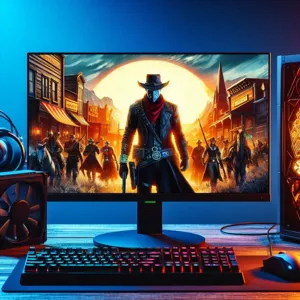In the ever-evolving landscape of PC gaming, the choice of operating system (OS) can make all the difference between a seamless gaming experience and one fraught with challenges.
With a myriad of options available, from the popular Windows to the emerging potential of Linux and the user-friendly macOS, gamers often find themselves at a crossroads. Each operating system brings its own set of features, compatibility, and performance levels that can significantly impact gameplay, graphics, and overall enjoyment. Whether you’re a casual player looking to dive into the latest titles or a hardcore gamer seeking every advantage in competitive play, understanding the strengths and weaknesses of each OS is crucial. In this comprehensive guide, we’ll delve into the intricacies of the best operating systems for PC gaming, helping you navigate the decision-making process with clarity and confidence, so you can optimize your setup and elevate your gaming experience to new heights.
1. Introduction to PC Gaming Operating Systems

In the vast and ever-evolving landscape of PC gaming, the operating system (OS) you choose is more than just a platform; it’s the foundation upon which your entire gaming experience is built. With a plethora of options available, ranging from the ubiquitous Windows to open-source alternatives like Linux, selecting the right OS can significantly influence performance, compatibility, and user experience.
Windows has long been the dominant player in the PC gaming arena, renowned for its extensive library of games and unparalleled support for the latest hardware and software. Its user-friendly interface, coupled with compatibility for a multitude of gaming peripherals, makes it a favorite among both casual gamers and hardcore enthusiasts alike. However, with the rise of Linux-based systems, many gamers are beginning to explore alternatives that promise enhanced customization and freedom from proprietary constraints.
In this guide, we’ll delve into the key features, advantages, and drawbacks of each operating system, helping you make an informed decision tailored to your gaming preferences. We’ll explore how each OS handles game installations, updates, and performance optimization, as well as discuss community support for troubleshooting and enhancements. Whether you’re a seasoned gamer looking to upgrade your setup or a newcomer eager to dive into the gaming world, understanding the nuances of each operating system will empower you to choose the one that aligns best with your gaming aspirations. Join us as we embark on this journey to uncover the perfect operating system for your gaming needs!
2. Overview of Popular Operating Systems for Gaming
When it comes to gaming on a PC, the choice of operating system plays a crucial role in your overall experience. The three most popular operating systems—Windows, macOS, and Linux—each offer unique advantages and drawbacks that can significantly influence gameplay, performance, and compatibility.
**Windows** is the dominant player in the gaming world, accounting for the vast majority of gamers’ setups. Its extensive compatibility with a wide range of games, from AAA blockbusters to indie gems, is unparalleled. With direct support for the latest graphics drivers and gaming technologies like DirectX 12, Windows ensures that gamers can tap into the full potential of their hardware. Additionally, the vast array of gaming peripherals and accessories, which often provide optimized drivers exclusively for Windows, further solidifies its position as the go-to OS for serious gamers. However, with all its advantages, Windows can sometimes be prone to stability issues or bloatware, requiring regular maintenance to keep it running smoothly.
**macOS**, on the other hand, offers a more polished and user-friendly experience but is often seen as a less viable option for gaming. While Apple has made strides in improving gaming performance with its recent hardware updates and the introduction of Metal for graphics rendering, the library of games available on macOS is still limited compared to Windows. Many popular titles may not be available natively, leading gamers to rely on workarounds like Boot Camp or virtualization software, which can impact performance. That said, if you’re already immersed in the Apple ecosystem and your gaming needs are more casual, macOS can still provide a satisfying experience.
**Linux** is often lauded for its open-source nature and customization options, making it a favorite among tech-savvy users. While traditionally seen as a less-than-ideal choice for gaming due to compatibility issues, the landscape has changed significantly in recent years. Platforms like Steam have made great strides in supporting Linux gaming, with a growing library of titles optimized for this OS. Additionally, tools like Proton allow many Windows-exclusive games to run on Linux, bridging the gap for avid gamers. However, the learning curve can be steep, and users may need to invest time in troubleshooting and configuration to achieve optimal performance.
In summary, the decision on which operating system to use for gaming boils down to your specific needs, preferences, and the types of games you want to play. While Windows remains the top choice for most gamers due to its unparalleled compatibility and performance, macOS and Linux are worth considering for specific use cases or if you’re looking for a unique gaming experience. Understanding the strengths and limitations of each can help you make an informed choice that enhances your gaming journey.
3. Windows: The Dominant Choice for Gamers

When it comes to PC gaming, Windows stands out as the undisputed champion, capturing a staggering market share that reflects its robust capabilities and extensive support for gaming. The reasons for this dominance are multifaceted, starting with the vast library of games available exclusively or primarily for Windows. Major titles, including AAA blockbusters and indie gems, are often developed with Windows in mind, ensuring that gamers have access to the latest and greatest in the gaming world.
One of the key advantages of Windows is its compatibility with a wide array of hardware. Whether you’re running a high-end rig with the latest graphics card or a more modest setup, Windows seamlessly integrates with various components, drivers, and peripherals, optimizing performance across the board. This flexibility enables gamers to customize their rigs according to their preferences and budget, ensuring a tailored gaming experience that can accommodate everything from casual gaming sessions to competitive play.
Furthermore, Windows consistently receives updates that enhance its performance and security features, making it a reliable choice for gamers who demand the best from their systems. The introduction of DirectX 12, for instance, has revolutionized graphics rendering and performance, allowing developers to create visually stunning games that push the boundaries of what’s possible on a PC.
Another significant factor contributing to Windows’ popularity is its vibrant gaming community. Platforms like Steam, Epic Games Store, and Origin thrive on Windows, offering gamers access to not only a vast selection of titles but also community features, multiplayer options, and frequent sales that make gaming more accessible and affordable.
While other operating systems have made strides in gaming, such as macOS and Linux, they still fall short in terms of game availability and optimization. For serious gamers, the choice is clear: Windows provides the most comprehensive, user-friendly, and future-proof environment for all your gaming needs. If you’re looking to dive into the world of PC gaming, choosing Windows will ensure that you’re equipped with the tools and support necessary to enjoy the immersive experiences that modern games have to offer.
4. macOS: Pros and Cons for Gaming
When it comes to PC gaming, macOS often finds itself in a contentious position. While Apple’s operating system is renowned for its sleek design, robust security, and user-friendly interface, it may not always be the first choice for gamers. Here’s a closer look at the pros and cons of macOS for gaming, helping you to determine if it aligns with your gaming needs.
### Pros of macOS for Gaming
**1. Stability and Security:**
One of the standout features of macOS is its stability. The operating system is less prone to crashes and malware compared to its competitors, providing a secure environment for gaming. This reliability can be particularly appealing for gamers who want a hassle-free experience without the constant worry of system failures.
**2. High-Quality Hardware:**
Apple’s hardware is designed with premium materials and exceptional craftsmanship, leading to high-performance machines capable of handling demanding titles. Macs often come equipped with powerful processors and high-resolution displays that enhance the gaming experience, especially for visually stunning titles.
**3. Exclusive Titles:**
Although the gaming library on macOS is smaller than that on Windows, there are still exclusive titles that can only be played on Apple devices. Games like “Civilization VI” and “Shadow of the Tomb Raider” have macOS versions, offering unique experiences that may not be available on other platforms.
### Cons of macOS for Gaming
**1. Limited Game Library:**
The most significant drawback of macOS for gaming is the limited selection of titles. Many popular games, particularly AAA titles, are often released for Windows first or exclusively. This can significantly restrict your gaming options if you’re committed to the macOS environment.
**2. Performance Issues:**
While Macs are known for their high-quality hardware, the gaming performance may not match that of similarly priced Windows PCs. Many games are optimized for Windows, meaning they can run more efficiently on that operating system, leaving Mac users facing lower frame rates and longer load times in some cases.
**3. Compatibility Challenges:**
Running certain gaming peripherals and software can be a headache on macOS. Some gaming mice, keyboards, and accessories are primarily designed for Windows, leading to compatibility issues. Additionally, if you enjoy using mods or customizations, you may find fewer options available for macOS compared to its more flexible counterpart.
In summary, while macOS offers a polished and secure environment that can appeal to certain gamers, its limitations in game availability and performance may deter those seeking a more robust gaming experience. If you’re a casual gamer who values design and stability, macOS might be suitable for you, but for hardcore enthusiasts, exploring a Windows-based setup could be more beneficial.
5. Linux: An Emerging Player in the Gaming Arena

In recent years, Linux has emerged as a formidable contender in the gaming landscape, challenging the long-held dominance of Windows. Traditionally seen as a platform for developers and tech enthusiasts, Linux is now catching the eye of gamers for several compelling reasons. With a growing library of compatible games and a supportive community, it’s becoming an increasingly viable option for those looking to maximize their gaming experience.
One of the most significant advantages of Linux is its open-source nature, which allows for greater customization and flexibility. Gamers can tailor their systems to suit their specific needs, optimizing performance, and enhancing graphics capabilities. Distributions like Ubuntu, Pop!_OS, and SteamOS have streamlined the installation process and made it easier than ever for users to dive into gaming without extensive technical expertise.
Moreover, the rise of gaming technologies such as Proton — a compatibility layer developed by Valve that enables Windows games to run on Linux — has dramatically expanded the library of titles available to Linux users. This means that popular AAA titles, indie games, and even some of the latest releases can be enjoyed without the need for a Windows operating system.
Furthermore, Linux benefits from lower resource consumption, which can free up more power for gaming. This efficiency can lead to smoother gameplay and improved performance on lower-end hardware, making it an attractive option for gamers on a budget.
However, it’s essential to note that while the gaming ecosystem on Linux is rapidly evolving, some titles may still face compatibility issues, and certain gaming peripherals may not have full support. Gamers considering the switch to Linux should conduct thorough research into the games they wish to play and check community forums for insights on performance and compatibility.
In summary, Linux is carving out its niche in the gaming arena, offering a unique blend of customization, efficiency, and an expanding library of games. As the gaming community continues to grow and innovate, Linux is positioned to be a valuable option for gamers looking to explore alternatives beyond traditional operating systems. For those willing to navigate its learning curve, the rewards can be substantial, making Linux an exciting player in the ever-evolving world of PC gaming.
6. Performance Comparison: Windows vs. macOS vs. Linux
When it comes to PC gaming, the choice of operating system can significantly influence your overall experience, and understanding the performance differences between Windows, macOS, and Linux is crucial for making an informed decision.
**Windows** has long been the dominant player in the gaming world, and for good reason. With the broadest compatibility for games, Windows boasts an extensive library of titles, ranging from indie gems to blockbuster hits. The operating system is optimized for gaming performance, offering support for DirectX, which enhances graphics and gameplay fluidity. Moreover, the regular updates and vast driver support for graphics cards mean that you can generally expect better performance and fewer issues than on other platforms. For gamers who prioritize high frame rates and cutting-edge graphics, Windows remains the gold standard.
**macOS**, on the other hand, often takes a backseat in the gaming arena. While it has made strides in recent years—thanks in part to the powerful M1 and M2 chips—its game library is still limited compared to Windows. Many popular titles simply aren’t available on macOS, and even those that are may not perform as well due to less optimization. However, for casual gamers or those who prefer gaming as a secondary activity, macOS can still provide a pleasant experience for lighter, less demanding games. Plus, the seamless integration with other Apple devices and the user-friendly interface can be appealing.
**Linux** is the underdog in this trio, often praised for its flexibility and open-source nature. While the number of games available for Linux is steadily increasing—thanks to platforms like Steam supporting Proton for compatibility—it’s still a smaller selection compared to Windows. Performance can vary widely, depending on how well a game is ported and optimized for Linux. Advanced users may appreciate the customization options and the ability to tweak their system for better performance. However, Linux may require more technical know-how to set up and maintain, making it less ideal for those who want a plug-and-play gaming experience.
In summary, if you’re seeking top-tier performance and the widest range of game options, Windows is your best bet. macOS may appeal to casual gamers or those already invested in the Apple ecosystem, while Linux offers a unique, customizable experience for the more tech-savvy gamer willing to navigate its limitations. Ultimately, the best choice depends on your gaming preferences, technical abilities, and how much you value performance versus convenience.
7. Game Compatibility: Which OS Supports Your Favorites?

When it comes to PC gaming, one of the most crucial factors to consider is game compatibility. Not all operating systems provide the same level of support for your favorite titles, and this can significantly impact your gaming experience. As you weigh your options, it’s essential to understand which OS aligns best with the games you love to play.
Windows has long been the dominant player in the gaming world, primarily due to its vast library of supported titles. From blockbuster AAA releases to indie gems, most games are optimized for Windows, ensuring the best possible performance. The compatibility extends beyond just the games themselves; many gaming peripherals, such as controllers and VR headsets, are designed with Windows in mind, offering seamless integration and functionality.
On the other hand, macOS has made strides in recent years, but its game library remains limited compared to Windows. While some popular titles are available, many gamers find themselves missing out on significant releases. Moreover, the gaming community on macOS is relatively smaller, which can lead to longer wait times for updates and fewer options for multiplayer gaming.
Linux, although gaining traction and offering some fantastic free-to-play games, still faces challenges when it comes to mainstream titles. While platforms like Steam have made strides in supporting Linux gaming, the reality is that many games require workarounds or additional software, such as Proton, to run effectively on this OS. If you’re passionate about open-source software and willing to navigate its complexities, Linux can be a rewarding option—but it might not be suitable for everyone.
When selecting an operating system for gaming, it’s vital to consider not just the games you currently enjoy but also any future titles you might be interested in. Research the compatibility of your favorite games and take stock of upcoming releases. Additionally, consider your gaming habits; if you enjoy playing the latest AAA titles, Windows is likely your best bet. However, if you’re drawn to indie games or have specific preferences that cater to Linux or macOS, those systems may also warrant consideration.
In summary, the right operating system for your gaming needs largely depends on the titles you want to play and how crucial a seamless gaming experience is to you. Take the time to explore each OS’s strengths and weaknesses, and you’ll be well on your way to choosing the perfect platform for your gaming adventures.
8. System Requirements: Hardware Considerations for Each OS
When it comes to PC gaming, selecting the right operating system is only part of the equation; understanding the system requirements associated with each OS is equally crucial. Different operating systems come with varying compatibility levels and performance capabilities, which can significantly impact your gaming experience.
### Windows
Windows has long been the favored choice among gamers, largely due to its extensive support for a vast library of games and gaming hardware. The system requirements for Windows can vary based on the version you choose—Windows 10 and Windows 11 are the most popular among gamers today. For optimal performance, ensure that your hardware meets the recommended specifications, which typically include a multi-core processor, at least 8GB of RAM (though 16GB is ideal for demanding titles), and a dedicated graphics card. Keep in mind that as games evolve, their requirements often increase, so investing in powerful hardware can future-proof your gaming setup.
### macOS
While macOS has made strides in gaming, it still lags behind Windows in terms of game availability. Many popular titles are either not available or run less efficiently on macOS. If you opt for macOS, it’s essential to choose hardware that meets the higher-end requirements for gaming. Recent Macs equipped with M1 or M2 chips provide impressive performance and can handle many games well, but be cautious as some older titles may not be compatible. Additionally, the limited upgradeability of Mac hardware compared to Windows systems could restrict your gaming potential down the line.
### Linux
Linux is gaining traction in the gaming community thanks to platforms like Steam offering a growing library of compatible games. However, Linux users often face unique challenges regarding hardware compatibility and driver support. To ensure a smooth gaming experience, it’s vital to check that your graphics card has reliable Linux drivers and that your system meets the minimum requirements for the games you wish to play. A robust setup with a multi-core processor and ample RAM (8GB or more) will enhance performance, but be prepared for a learning curve when it comes to optimizing your system for gaming.
### Conclusion
Ultimately, the choice of operating system will hinge on your gaming preferences, the types of games you wish to play, and your hardware setup. By carefully considering the system requirements of each OS and aligning them with your gaming hardware, you can ensure a more enjoyable and seamless gaming experience. Whether you choose Windows for its comprehensive support, macOS for its sleek performance, or Linux for its open-source flexibility, understanding the hardware implications will set you on the path to gaming success.
9. Drivers and Updates: Importance for Gaming Performance
When it comes to maximizing your gaming performance, the role of drivers and updates cannot be overstated. Drivers are the crucial pieces of software that allow your operating system to communicate with your hardware, including your graphics card, sound card, and other peripherals. Keeping these drivers up to date ensures that your gaming rig can leverage the latest optimizations and enhancements provided by manufacturers.
For gamers, outdated drivers can lead to a myriad of issues, from reduced frame rates and stuttering graphics to crashes and compatibility problems with new titles. For instance, graphics card manufacturers like NVIDIA and AMD frequently release driver updates that not only fix bugs but also enhance performance for newly launched games. By installing these updates, you can often unlock additional frames per second (FPS), sharper graphics, and improved overall stability during gameplay.
Equally important are system updates for your operating system. Whether you’re using Windows, Linux, or another OS, regular updates will patch security vulnerabilities, improve system stability, and sometimes even include optimizations that enhance gaming performance. For example, Microsoft frequently rolls out updates that improve DirectX performance, which is crucial for many modern games.
Incorporating a routine check for both driver and system updates into your gaming regimen can make a noticeable difference in your gaming experience. Whether you set a reminder to check for updates weekly or take advantage of automatic updates, staying current with the latest software versions can help you avoid potential pitfalls and ensure that your gaming system runs at its best. In a world where milliseconds can make the difference between victory and defeat, prioritizing your drivers and operating system updates is a critical step toward achieving peak gaming performance.
10. User Interface and Experience: Which OS is More Gamer-Friendly?
When it comes to gaming, the user interface (UI) and overall user experience (UX) of an operating system can significantly impact how players interact with their games and manage their systems. A gamer-friendly OS should not only provide easy access to games but also facilitate smooth navigation and customization options to enhance the gaming experience.
Windows, long considered the dominant platform for PC gaming, boasts a familiar and intuitive interface that many gamers have grown accustomed to. Its Start Menu provides quick access to installed games, and the taskbar allows for easy switching between applications. Furthermore, Windows supports a vast array of gaming peripherals and software, making it an ideal choice for gamers who want to optimize their setups. With features like the Game Bar, gamers can record gameplay, take screenshots, and access settings without interrupting their session, all of which add to the seamless experience Windows offers.
On the other hand, macOS, while known for its sleek design and stability, tends to lag in the gaming department. The user interface is polished and user-friendly, but the limited selection of games on this platform can be a drawback for serious gamers. Additionally, macOS is often not as customizable as Windows when it comes to performance tweaks and optimizations for gaming. However, for casual gamers or those who prioritize a clean and aesthetically pleasing interface, macOS can still provide a satisfactory experience.
Linux, meanwhile, has made significant strides in recent years with distributions like SteamOS and Pop!_OS designed specifically for gaming. The open-source nature of Linux allows for extensive customization, and many gamers appreciate the control they have over their system. However, the learning curve can be steep for newcomers, and compatibility issues with certain games and hardware may create a frustrating experience. The user interface can vary significantly between different distributions, which may be a determining factor for gamers looking for a specific look and feel.
Ultimately, the best OS for gaming will depend on individual preferences and gaming habits. Windows remains the go-to choice for its extensive game library and user-friendly interface, while macOS and Linux offer unique advantages and experiences for those who prioritize design or customization. As you weigh your options, consider how each operating system aligns with your gaming needs and lifestyle—after all, the right OS can elevate your gaming experience to new heights.
11. Customization Options: Flexibility for Gamers
When it comes to PC gaming, customization is paramount, and the operating system you choose can make all the difference in how flexible your gaming experience can be. A gaming-friendly OS should not only support a wide array of titles but also allow you to tailor the environment to suit your unique preferences and needs.
Windows, for instance, is renowned for its extensive customization capabilities. From tweaking system settings to enhance performance, to configuring graphics options for individual games, Windows provides gamers with the tools to fine-tune every aspect of their experience. Third-party applications and mods can easily be integrated, allowing you to adjust everything from user interfaces to in-game controls, ensuring that your gaming setup is as comfortable and efficient as possible.
On the other hand, Linux has gained traction in the gaming community for its high level of customization, albeit with a steeper learning curve. While traditionally seen as less compatible with mainstream games, many distributions now offer excellent support through platforms like Steam’s Proton, which allows Windows games to run seamlessly. The open-source nature of Linux enables enthusiasts to modify the OS down to the kernel level, giving technically savvy users the flexibility to create a gaming environment that is uniquely their own.
Regardless of your choice, having the ability to customize your operating system can significantly enhance your gaming experience. Whether it’s adjusting performance settings, organizing game libraries, or establishing shortcuts for quick access, the right OS will empower you to create the perfect gaming sanctuary tailored to your style. Embrace the flexibility offered by your chosen operating system, and watch as it transforms your gaming sessions into extraordinary adventures.
12. Gaming Communities and Support: Where to Find Help
When it comes to PC gaming, navigating the vast landscape of platforms and technologies can sometimes feel overwhelming. However, one of the most powerful resources at your disposal lies in the vibrant gaming communities and support networks that thrive online. These communities are not only hubs for sharing tips and tricks but also invaluable sources of assistance for troubleshooting issues, finding the best hardware, and discovering new games.
First, consider joining forums and discussion boards dedicated to gaming, such as Reddit’s numerous gaming subreddits, the Steam Community, and specialized forums like NeoGAF or GameFAQs. Browsing through these platforms can provide you with a treasure trove of information. Users often share their firsthand experiences with different operating systems, helping you gauge which one might suit your gaming needs best.
Social media platforms also host lively gaming communities. Join groups on Facebook or follow gaming influencers on Twitter and Twitch, where you can engage in discussions, ask questions, and receive real-time feedback from fellow gamers. Many content creators host live Q&A sessions or post video tutorials that can help you solve problems or optimize your gaming setup.
In addition to community support, don’t overlook the resources provided by game developers and hardware manufacturers. Many companies maintain forums or knowledge bases where you can find official documentation and troubleshooting guides. For example, NVIDIA and AMD both offer extensive support sections for their graphics cards, including common issues and solutions tailored to specific operating systems.
Finally, if you prefer a more personal touch, consider exploring Discord servers dedicated to your favorite games or gaming genres. These servers often have channels for technical support, where experienced members can offer guidance or share their expertise. Being part of a community not only enhances your gaming experience but also connects you with others who share your passion.
By leveraging these diverse gaming communities and support channels, you can easily find the help you need to enhance your PC gaming experience, troubleshoot any issues, and ultimately choose the operating system that best meets your gaming needs. Remember, you’re never alone in the gaming world; a community of passionate gamers is just a click away.
13. Future Trends in Gaming Operating Systems
As the gaming landscape continues to evolve, so too do the operating systems that support it. Keeping an eye on future trends in gaming operating systems can provide valuable insights into what gamers can expect in the coming years. One of the most significant trends is the rise of cloud gaming. With services like Google Stadia, NVIDIA GeForce NOW, and Xbox Cloud Gaming, the need for powerful local hardware is diminishing. Instead, gamers are beginning to prioritize operating systems that seamlessly integrate with cloud services, allowing them to access their favorite games from virtually any device with an internet connection.
Another notable trend is the increasing importance of cross-platform compatibility. As gamers demand more flexibility, operating systems that support cross-play and cross-save features are gaining traction. This means that whether you’re on Windows, macOS, or even Linux, you can enjoy a unified gaming experience with friends, regardless of the platform they choose. Developers are recognizing this need, prompting them to create games that can be played across multiple operating systems without sacrificing performance or user experience.
Additionally, the integration of artificial intelligence (AI) and machine learning into gaming operating systems is set to revolutionize how players interact with their games. From adaptive difficulty levels that respond to a player’s skill set to smarter matchmaking systems that pair players based on their behavior and preferences, AI can enhance the overall gaming experience. Operating systems that effectively harness these technologies will likely lead the way in the competitive gaming market.
Lastly, as we see more emphasis on user experience, gaming operating systems are expected to incorporate more customizable features, allowing players to tailor their environments to suit their personal preferences. From dynamic interfaces to customizable performance settings, the demand for a personalized gaming experience is stronger than ever.
In summary, the future of gaming operating systems is not just about performance but also about creating a holistic, user-centric experience that embraces emerging technologies and adapts to the evolving needs of gamers. Staying informed about these trends will help you make strategic decisions when choosing the best operating system for your gaming setup.
14. Making the Switch: Tips for Transitioning Between Operating Systems
Making the switch between operating systems can be a daunting task, especially for gamers who rely heavily on performance and compatibility. However, with the right approach, you can transition smoothly and enhance your gaming experience in the process. Here are some essential tips to help you navigate this change effectively.
First and foremost, it’s crucial to research the operating system you plan to switch to. Different OS options—like Windows, macOS, and Linux—offer varying levels of support for gaming. Windows remains the most popular choice among gamers due to its extensive library of games and support for the latest hardware. However, if you’re considering a shift to Linux for its open-source benefits, be prepared for some initial hurdles, such as finding compatible games and drivers.
Before making the switch, back up all your important files and game data. This step is vital to ensure you don’t lose any progress or essential documents during the transition. Use external drives or cloud storage services to create a comprehensive backup. This habit will not only save you from headaches but will also give you peace of mind as you proceed.
Once you’ve backed up your data, create a list of your most-played games and check their compatibility with the new operating system. Many popular titles are natively supported on Windows, while others may require workarounds or emulators on platforms like Linux. Websites such as ProtonDB can provide insights on how well games perform on Linux, helping you make informed decisions about your gaming library.
When you’re ready to install the new operating system, consider setting up a dual-boot system. This setup allows you to keep your current OS while experimenting with the new one. It gives you the flexibility to switch back if you encounter issues, ensuring you don’t sacrifice your gaming experience. For those who prefer a fresh start, a clean installation will require you to reinstall games and applications, so plan this process carefully.
Finally, once you’ve successfully transitioned, take time to familiarize yourself with the new environment. Each operating system has its own set of features, settings, and shortcuts that can enhance your gaming experience. Explore the settings to optimize performance, adjust graphics configurations, and customize controls according to your preferences. Engaging with community forums and gaming groups can also provide valuable tips and tricks tailored to your new operating system.
By following these steps, you can ensure that your transition between operating systems is as seamless as possible, allowing you to dive back into your favorite games and explore new titles with confidence. Happy gaming!
15. Conclusion: Choosing the Right OS for Your Gaming Needs
In the rapidly evolving world of PC gaming, selecting the right operating system (OS) can significantly influence your overall experience and performance. As we conclude this comprehensive guide, it’s essential to summarize the key considerations that will help you make an informed decision tailored to your gaming needs.
First and foremost, evaluate the types of games you play and the performance requirements they demand. If you’re an avid player of AAA titles that require robust hardware support and the latest graphical enhancements, Windows 10 or 11 may be your best bet due to their widespread compatibility and optimization for gaming. On the other hand, if you lean towards indie games or niche titles, you might explore alternatives like Linux, which can offer a lightweight environment and impressive customization options.
Next, consider your hardware. Some operating systems are better optimized for specific types of hardware setups. For instance, if you have high-end components, Windows tends to unlock their full potential, thanks to regular updates and driver support from manufacturers. If you’re using older hardware, a lightweight Linux distribution could breathe new life into your gaming rig by reducing resource overhead.
Also, don’t overlook community support and software availability. Windows has a vast library of games and applications, and its user base means you’ll find plenty of forums and resources for troubleshooting. Conversely, while Linux has made significant strides in terms of gaming compatibility—especially with platforms like Steam—its library is still not as extensive as Windows.
Lastly, think about your personal preferences and familiarity with an OS. If you’re comfortable navigating Windows and are used to its ecosystem, switching to a different OS might lead to unnecessary frustration. However, if you’re tech-savvy and enjoy tinkering, exploring alternatives could be a rewarding experience that enhances your gaming setup.
In conclusion, the right operating system for your gaming needs hinges on a combination of performance, compatibility, community support, and personal preference. Take the time to assess your unique gaming habits and hardware configuration, and you’ll be well on your way to creating an optimized gaming environment that keeps you fully engaged in your virtual adventures. Happy gaming!
In conclusion, selecting the right operating system for your PC gaming setup can significantly enhance your overall gaming experience, ensuring optimal performance and compatibility with your favorite titles. We hope this comprehensive guide has illuminated the key features and considerations needed to make an informed decision. Whether you lean towards the robust architecture of Windows, the versatility of Linux, or the seamless integration of macOS, understanding your gaming needs and preferences is crucial. As you embark on this journey, remember to keep your system updated and explore the vast world of games available on your chosen platform. Happy gaming, and may your adventures be filled with excitement and unforgettable moments!






